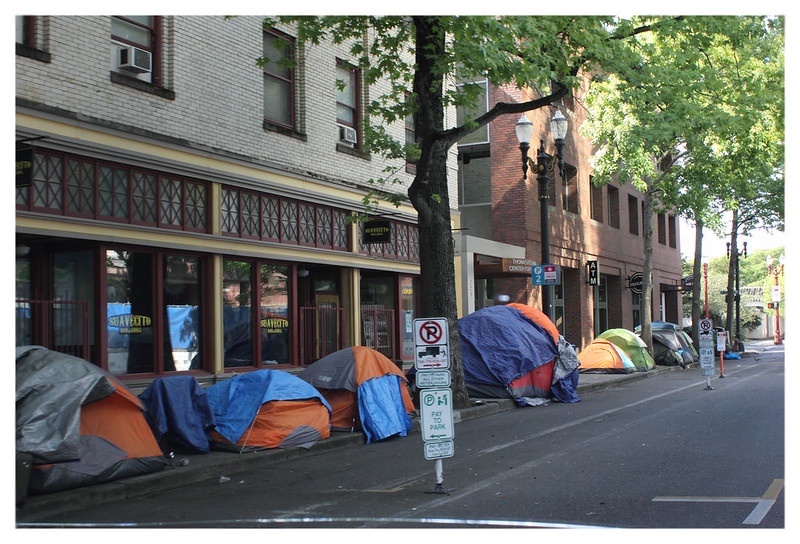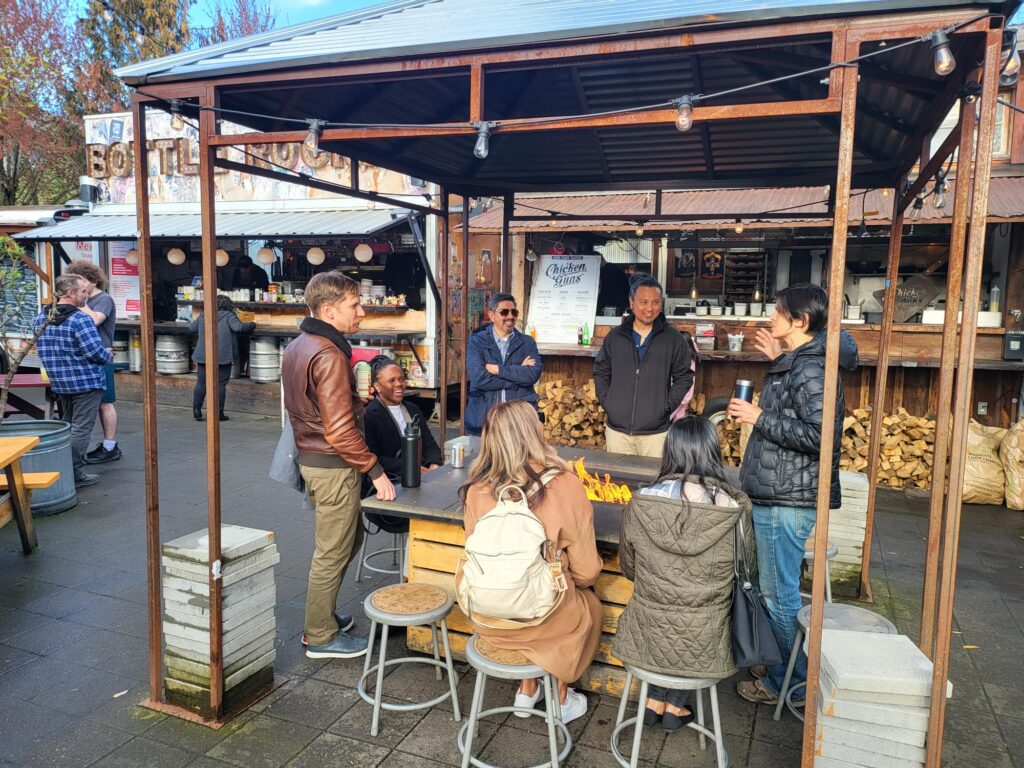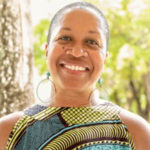BY Ronda Lee Chapman, National Equity Director, Trust for Public Land, and 2023 PLACES Fellow
“Keep Portland Weird” is a vibe, albeit one that has perhaps run its course.
I lived in Stumptown for just over a decade in the early aughts. It’s where I cut my teeth as a sustainability generalist, dug deep into diversifying the environmental movement, and gained a rich understanding of what it takes to bring an equitable city to life or not.
The 2023 PLACES Fellows gathered in Portland, Ore., for our first retreat in April. I was both excited and anxious to revisit the place that had shaped a significant decade of my life professionally and personally. I was ready to experience the liberal vibrancy, the amazing food, the emerging multiculturalism, the liberal politics.
What happened instead was profoundly different.
Well, except for the rain. That was consistent and appropriate.
Before I go further, I feel compelled to shout out to this blog by another member of our 2023 PLACES cohort, Shilpa Shankar, that shares not only her beautifully worded reflections, but some of the details about our Portland journey. My point of view will be a touch different due to my previous relationship with the town.
As my co-fellow Joy Webb and I were walking through downtown, we talked about what I coined “the myth of the liberal west:” the notion that the Best Coast is rife with utopian opportunities in which rainbows and unicorns (Black and white ones!) are abundant. A place the rest of the liberal U.S. can look upon with envy and aspiration. It’s climate ready, Mother Earth-loving, vegan friendly, creative, kind, multicultural, and equitable.
But as Joy and I stepped over puddles and around unhoused human beings slumped against buildings, things felt heavy.
As we ventured on to the light rail, we noticed most riders relied on the train to keep them dry, provide a space to sleep, and offer shelter for soothing their addictions.
How can it be that so many folks meandering through the city could be in such need? Why were there so many security guards posted at the entry of commercial buildings? Why was the CVS essentially void of products? Why was there such a prevalence of closed businesses? Why were the downtown streets void of locals? What was happening to this place I once called home?

Portland, like many cities, is struggling to address the needs of unhoused people, many of whom rely on tents for basic shelter.
Photo credit: dr.ōzda | Flickr
Since PLACES was there, I took the opportunity to join a longtime Portland friend for a walk at Mt. Tabor one evening. She shared what she and her husband had been experiencing in town. They recently moved to an adjacent county because Portland was taking a turn for the worse and they no longer felt safe from street harassment and multiple home and car burglaries. It was affecting their psyche and their wallets.During my 2001-2012 stint in PDX, local residents seemed to be forever protesting for any matter pertaining to justice and equity. Protests were part of the fabric and while it wasn’t my vibe, I was always pleased to see people organizing for the ideological opportunities I mentioned before. But then came 2020, when the whole world was protesting for social justice. While I was no longer in Portland, I’ve been paying attention. Liberals were protesting per their norm, but it seems like something just snapped and they haven’t recovered.
According to an Oregon Public Broadcasting report from July of this year, hate crimes for the state are up 76% since 2020. “Anti-Black/African American bias continues to be the largest category, making up a quarter of the reports. Bias-motivated reports targeting people who identify as LGBTQ+ increased between 2021 and last year, with reports targeting sexual orientation up 97% and gender identity up more than 150%. Reports targeting religion also increased, with antisemitic reports making up 75% of anti-religious reports since 2020. Anti-Asian reports decreased slightly last year compared to 2021 when such reports rose as a result of hateful rhetoric related to the COVID-19 pandemic.” Portland’s and Oregon’s bigotry-filled,racist origin story has reared its ugly head.
It’s also an economic issue — though poverty and racism are so intertwined, so no surprises there. I found this article from the Willamette Week, the local paper. The report refers to an “out migration” over the past three years. “Most of the people who spoke with WW were leaving for two reasons: high taxes and a growing sense of danger.”
According to a lifelong Portland resident quoted in the article, up until 2020, “[n]obody ever wanted to leave Oregon. It’s a beautiful place. Most evacuees are high-wage earners who are fed up with the crime, taxes and homelessness, in that order. There’s an ugly spiral.”
Listen, if you don’t know me, you might think I’m a bit of a downer at this point.
But it’s precisely because I am, by nature, a joyful soul whose heart was aching at what I witnessed. I regard Portland as a place that set me up for many of the successes I experience today.

2023 PLACES Fellows traveled to Portland, Ore., for the first site visit of their year-long learning journey.
Photo credit: Dion Cartwright
Then it occurred to me on my flight home to D.C.: this is why I am here with PLACES and in the nonprofit sector.
This heartache drives my purpose because I believe in justice, humanity, equity, and fairness.
And I am aware of the role philanthropy plays in addressing some of these issues — for better or worse.
So here we are. Collectively learning, adapting, and pushing to be on the right side of history. We are the consciousness-keepers who provide the wood for the organizers to build the table.
It’s so important for us who claim space in philanthropy to get out from behind our desks and get into the community. But given the demands of our jobs and everyday lives, it can be difficult for us to do so.
That’s one of the many gifts PLACES offers: The fellowship’s site visits are both an opportunity and a reminder to be intentional in finding time to physically and mentally be in the spaces and places most impacted by injustice.
Even if — especially if — it makes your heart ache.
About the Author
Ronda Lee Chapman is the National Equity Director at the Trust for Public Land, where she works to bring parks and nature to the places, people, and communities that can most benefit as a matter of health, equity, and justice. She is also a member of TFN’s 2023 PLACES Cohort.
is the National Equity Director at the Trust for Public Land, where she works to bring parks and nature to the places, people, and communities that can most benefit as a matter of health, equity, and justice. She is also a member of TFN’s 2023 PLACES Cohort.
Featured image at top: Portland skyline, Jonathan Miske | Flickr
